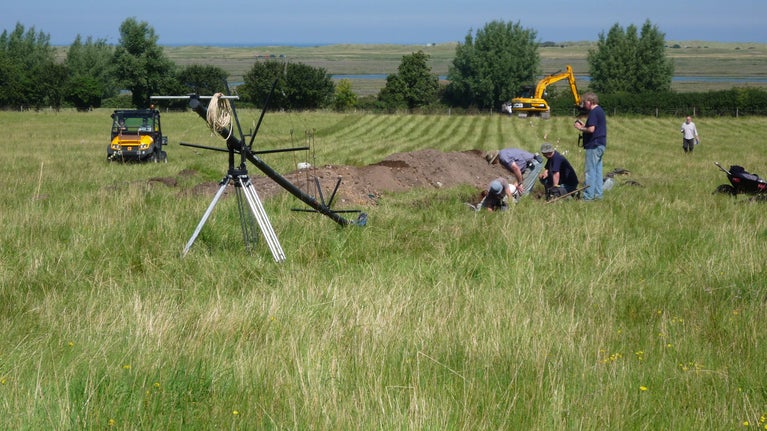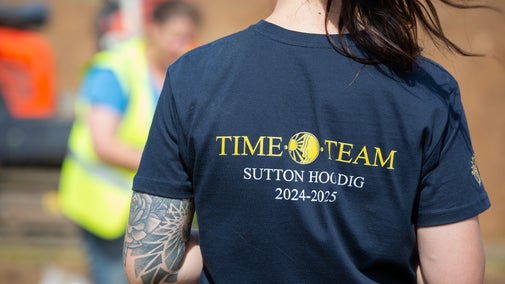Time Team to return to Branodunum
- Published:
- 31 January 2025
- Last updated:
- 21 September 2025

Jump to
Time Team has announced that it will be carrying out new geophysical surveys at the site of Branodunum Roman Fort, Brancaster.
Experts from the show will be visiting the site this autumn, when they will be using specialist Ground Penetrating Radar (GPR) equipment to ascertain what new archaeological secrets the site may contain.
Sir Tony Robinson and a team of Time Team volunteers first came to Branodunum in 2012. Following a geophysical survey of parts of the site, an archaeological dig with five trenches was carried out.
The dig revealed several previously unknown buildings inside the fort, including huge granaries, barrack blocks for soldiers, and a possible bath house.
Various artefacts pre-dating circa 225-250 AD were recovered, including pieces of pottery and glass, and some Roman coins.
It is hoped that this autumn's geophysical survey, focusing on parts of the site that were not surveyed in 2012, will reveal important new features.
Branodunum Roman Fort
The fort at Branodunum was both a staging post for traders and a military base. First, an infantry unit from Gaul (modern France) was stationed at Branodunum and then later cavalry from Dalmatia (modern Croatia and Bosnia).
Soldiers and traders from other nations would have passed through the fort, and all would have mingled with British people in the village (vicus) outside its walls. Naval and trading vessels would have landed at the nearby Roman beach.
Branodunum is one of eleven forts along the south and east coasts of England, known as the Saxon Shore forts. The Romans built these forts during the 3rd century AD.
At first, they were used to protect and control shipping and trade around the coast; later they helped repel raiders from across the North Sea.
The forts remained military stations for over 150 years before being abandoned when the Roman army withdrew from Britain.
Eagerly anticipating the return of Time Team
Victoria Egan, General Manager, Norfolk Coast & Broads, comments:
“Although 13 years have passed since the first Time Team dig at Branodunum, the visit by the team is well-remembered by many in the local community and by the National Trust staff and volunteers who were fortunate enough to be involved.
“It was a unique opportunity for us to learn more about Brancaster’s Roman heritage and the importance of this site. We’re all eagerly awaiting the return of Time Team and excited to find out what this work might tell us about areas of the site that were not covered by the geophysical surveys in 2012.”
Time Team’s Creator and Series Producer Tim Taylor said:
“We are all really excited about returning to Branodunum. Our growing partnership with the National Trust is a great opportunity to continue unearthing these fascinating stories of the past. Our fans love to keep up to date with any news related to previous digs, so we know they will be delighted to learn that we are back here again.”
You might also be interested in
Branodunum Roman Fort
The ancient Roman fort of Branodunum, just outside Brancaster, was built in the 230s and later became part of the Saxon Shore fortification system.

Looking after the archaeology of the coast
National Trust staff and volunteers help preserve dozens of archaeological sites along the north Norfolk coast – from Roman fortifications to Cold War installations.

Time Team at Sutton Hoo
The National Trust has joined forces with Time Team on a new two-year research project at Sutton Hoo.
